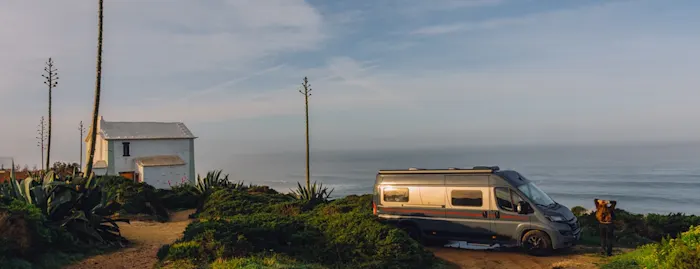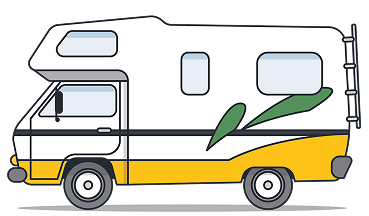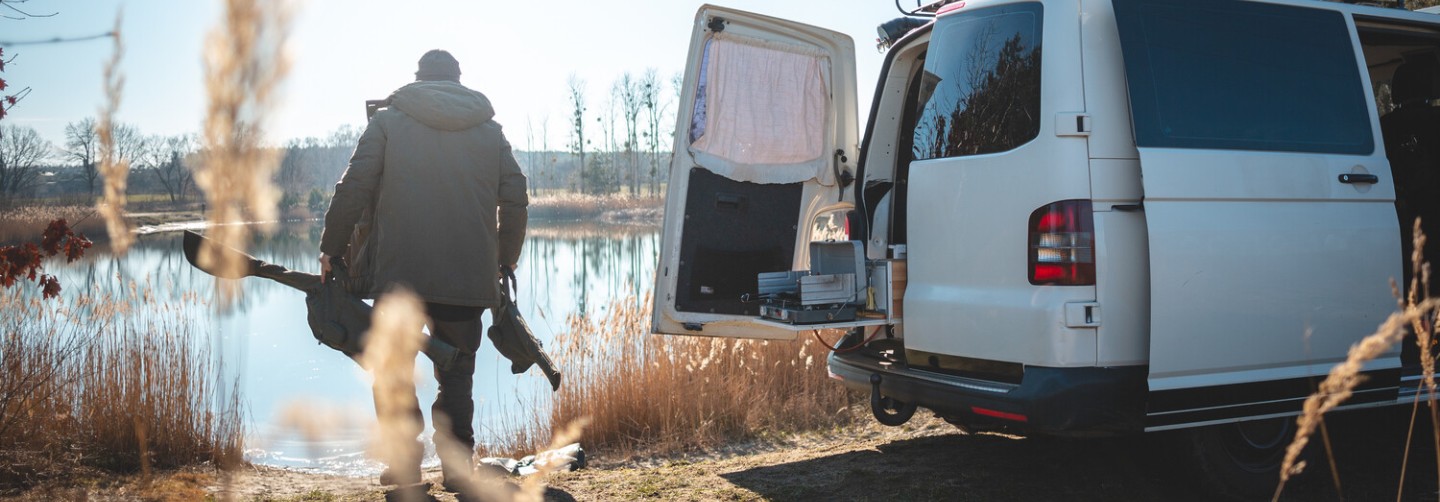
Tips on how to find the ideal campsite for your fishing holiday
Updated at: 09/01/2026
Reading time: 7 minutes
Choosing the right campsite is important so that your next fishing holiday will be fruitful and stress-free. Should you choose a campsite with its own fishing spot? In addition, what should anglers be mindful of when looking for a campsite for a fishing holiday? In this article we will answer these questions and give you some useful tips on how to find the ideal campsite for your next fishing holiday.
Camping near a body of water
A fishing holiday is the perfect choice for anybody who enjoys fishing and camping. There are a wide range of campsites to choose from, which offer different onsite facilities. However, the best choice would be a campsite that has its own fishing spot. Some campsites even offer pitches that are directly next to a lake or a river where you can go fishing.
The number of pitches available at campsites which offer onsite fishing are generally limited, even though a lot of anglers would ideally prefer to be able to fish directly from their booked pitch. Nevertheless, there are lots of fantastic campsites that do not have direct access to a body of water and yet are ideal for anglers. When it comes to choosing the ideal campsite, it isn’t only the location that plays an important role, but also the campsite facilities.
Campsites with fishing facilities
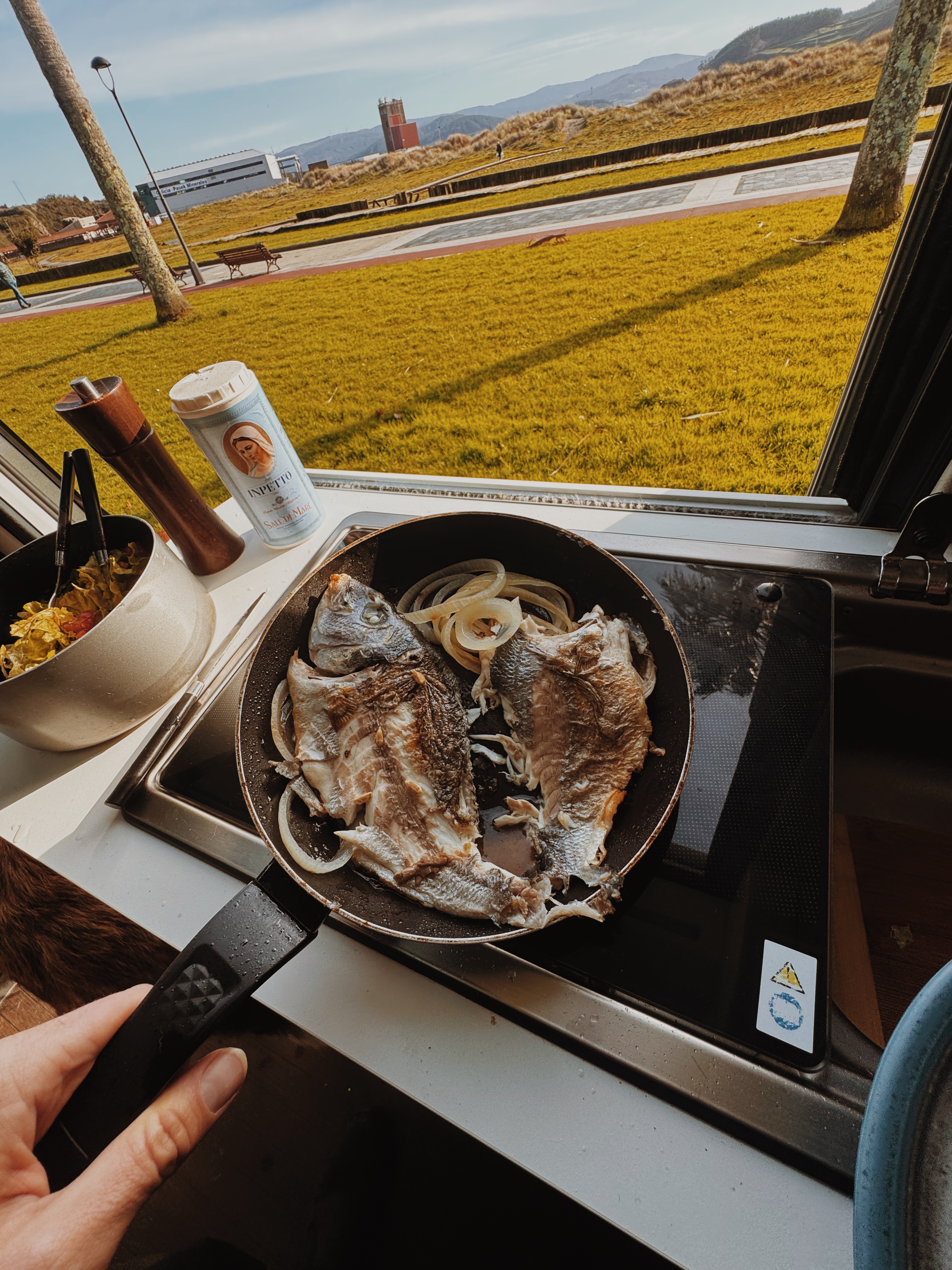
If you would like to bring your own boat with you for a fishing holiday, you will need a slipway and a mooring to launch your boat at the campsite. Make sure to contact the campsite in advance to find out about free moorings and the maximum length of a boat that can be launched. Alternatively, there are campsites that offer boat rentals for fishing. Prior to making a booking it is a good idea to make an enquiry about what type of boats are available to rent.
After you have been fishing and caught some fish, you will want to prepare it for dinner. A campsite with kitchen facilities is ideal for preparing your fish. Often you can leave your camping barbecue at home, as most campsites have a communal barbecue. Some campsites also have large freezers which you can use to store your fish.
Some of the best fishing campsites have a laundrette and drying rooms where you can wash and dry your fishing clothes and equipment. During the summer months you can use a clotheshorse or a washing line to hang up your clothes or fishing equipment outside and leave them to dry.
A summary of what campsite facilities you should look out for when organising your next fishing holiday:
Fishing tuition
Kitchen facilities
Laundrette
Slipway and mooring (if you have your own boat)
Boat rentals
Communal barbecue
Fridge and freezers
Communal dish washing facilities
Nearby fishing shops
Laws regarding fishing in the UK
In the UK there are different fishing laws which you will need to adhere to. It is a good idea to check what laws and regulations are in place before making a booking. You can get a fine of up to £2,500 if you don’t have a valid rod fishing licence in any areas that require one. Please also keep in mind some fish can only be caught at certain times of the year. Below you will find a brief summary of the different fishing laws in the UK. However, it is always advised to check the gov.uk website where you can find out more information on fishing laws.
England & Wales:
In England and Wales you will need a fishing licence if you’re fishing for salmon, trout, freshwater fish, smelt or eel with a rod and line. Please also don’t forget to seek permission from the landowner to fish on any private land. You will also need an additional licence to fish in locks or weirs on the River Thames. You must also follow any national and local laws when freshwater fishing with a rod and line. The aim behind this is to protect fishing stocks and to make fishing sustainable.
Northern Ireland:
If you would like to go fishing in Northern Ireland, you will need a rod licence and angling permit from a Northern Irish agency.
Scotland:
In Scotland you will not need a licence to fish with a rod and line anywhere apart from in the Border Esk region. However, you will still need to seek the landowner’s or angling club’s permission beforehand. The Border Esk flows into England which means you will need to purchase a rod fishing licence for England. This also includes the parts of the river and its tributaries that are in Scotland.
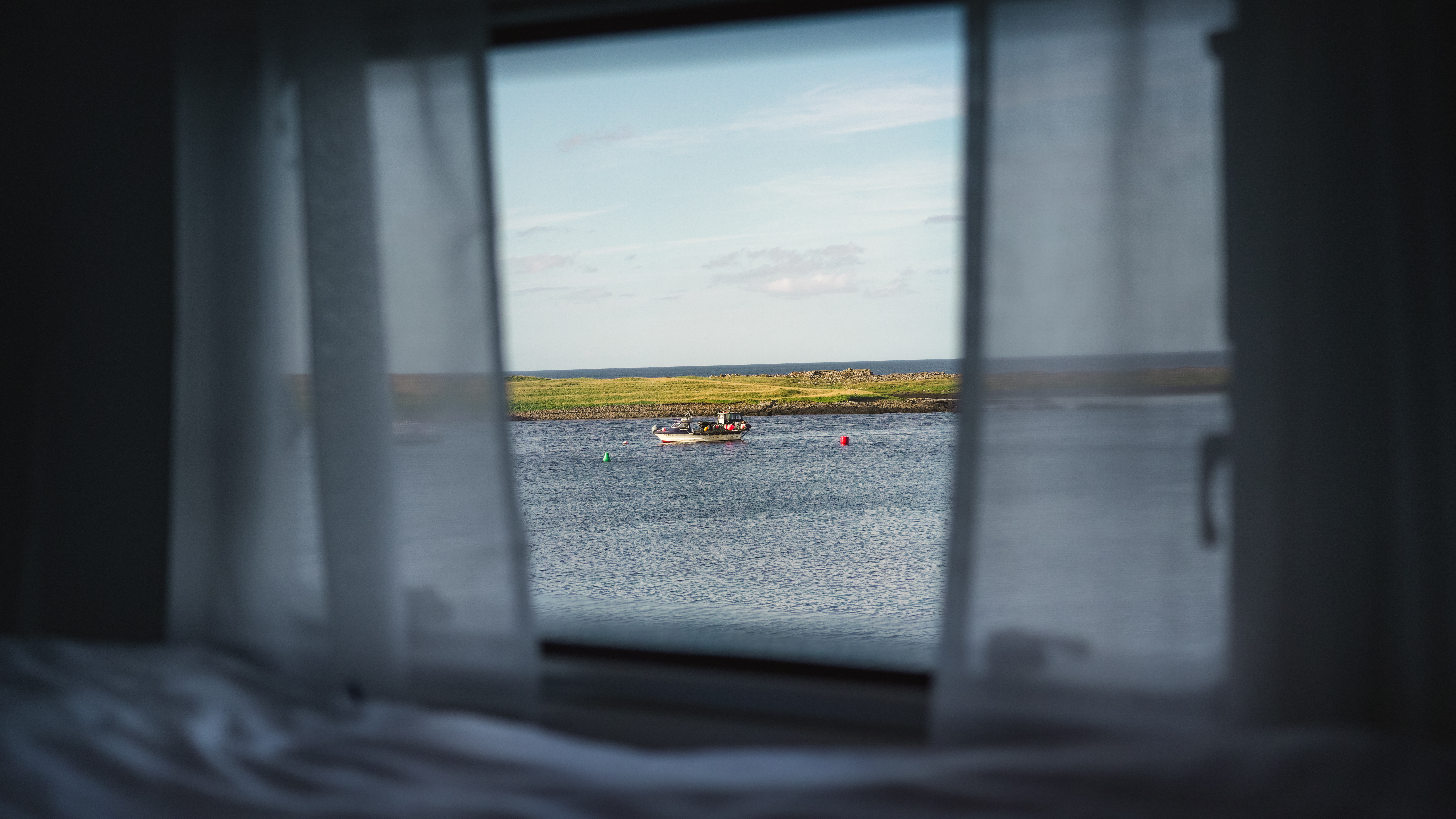
Popular places to go camping and fishing
Fishing is one of the UK’s biggest participation sports and the UK is not only known for its stunning scenery, but also for a lot of fantastic places you can go to on a fishing holiday. There are a wide range of rivers, lakes and coastal places where you can go fishing. The country is so varied and there are lots of different fish you can catch.
Below you will find some of the most popular regions in the UK to go fishing:
Derbyshire: the River Dove and the Peak District
Cumbria: Windermere and the Lake District
Devon: Angler’s Paradise
Eastern Scotland: Perth and Tayside
South Wales: Swansea and the Gower Peninsula
Northern Ireland: Donaghadee
The UK has something for every fishing enthusiast, whether they are a beginner or an experienced angler. There is a wide range of fishing spots to choose from such as on the coast, in a river or at a relaxing spot by a lake. If you are looking for ideas or more inspiration for your next fishing holiday, why not contact other fishing clubs, forums or fishing social media sites to get inspired.
Being well prepared
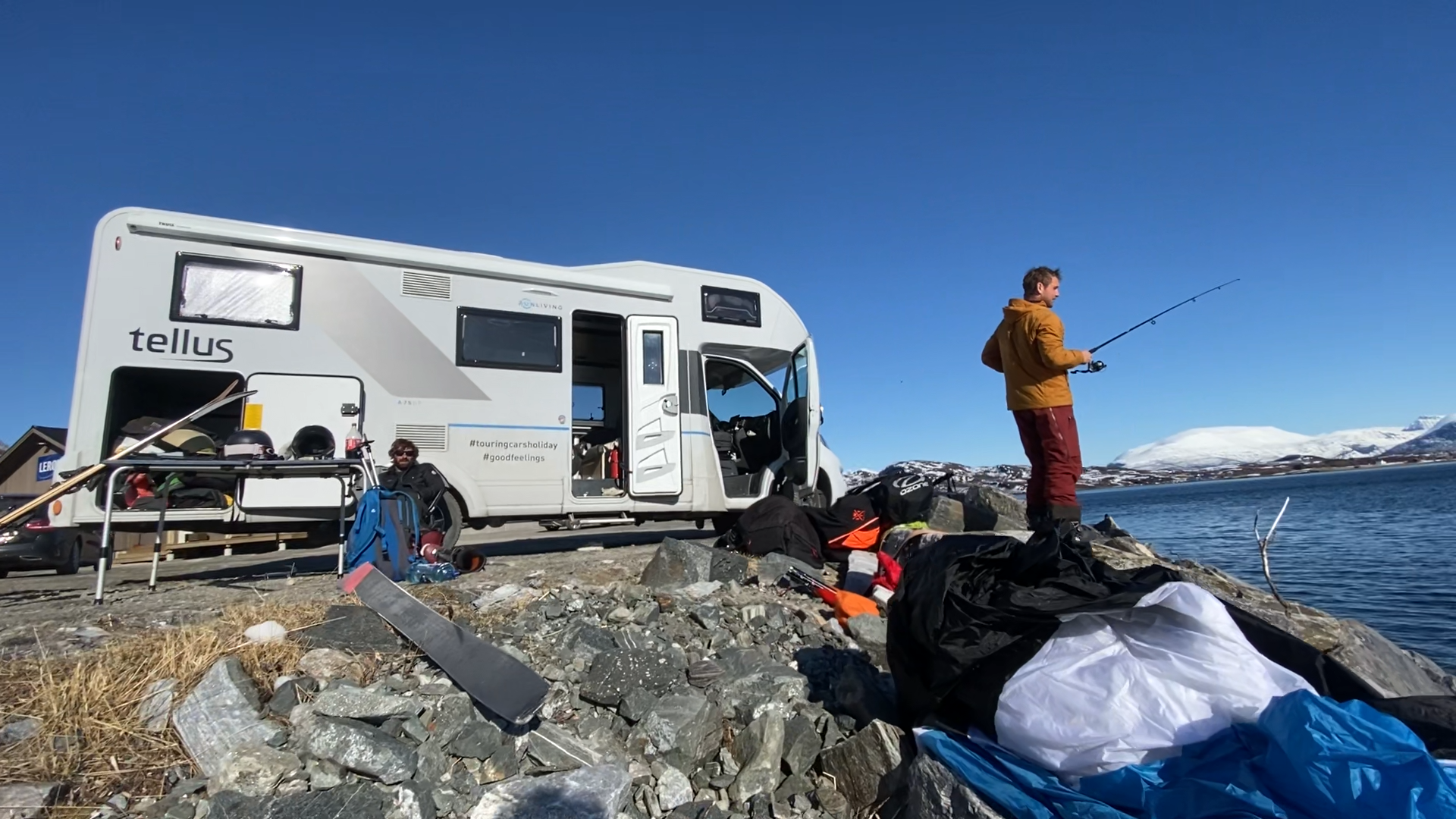
Before embarking on your fishing holiday, it is a good idea to check if you have everything you need, especially if you have never been fishing at that place before. Make sure to find out beforehand what kind of fish you can catch, the local fishing stocks, what thewater quality is like and where is the best spot to go fishing. You can find out more information about the local water bodies from fishing clubs or leaseholders.
Depending on where you are going to go fishing on your holiday will determine what you should take with you. Before embarking on your fishing holiday, find out if there is a specialist fishing shop near the campsite. This way you are well-prepared for any emergencies, and you can buy bait or new accessories if needed. It is also a good idea to visit a local fishing shop for further helpful fishing tips about the local area.
How to safely stow away your fishing equipment in a campervan
People who often go on campervan holidays are great at packing and being organised. In addition to the everyday items you will need for a camping holiday, you should also think about how to safely stow away your fishing equipment. It is a good idea to go through your fishing equipment before packing everything. This way you can be sure that you are only taking the things you will really need.
Below you will find some helpful tips on how to pack and organise everything in your campervan:
Less is more
Be mindful of the total weight
Put anything heavy or bulky at the bottom and lighter more delicate things on top
Stow away any loose items
You can find some helpful tips on how to pack efficiently so that you save fuel in the following guide: Sustainable travel: tips for an environmentally friendly camping holiday
Getting the most out of your fishing holiday
Camping and fishing are the perfect combination if you would like to pursue your hobby whilst on holiday. Lots of campsites which offer fishing have great onsite facilities such as a communal barbecue or freezers for storing your fish. Make sure to find out in advance what onsite facilities are available and if there are any extra fees for fishing. It is important to also check any local fishing laws and whether you will need a fishing licence. When packing for your fishing holiday check what fishing equipment you will need and avoid packing anything you won’t need. Before setting off, stow everything away safely and then you can set off and enjoy your relaxing fishing holiday.

Do you have any feedback on the article, questions about booking a motorhome, or are you looking for tips? Then feel free to write to us here. We will get back to you as soon as possible.

